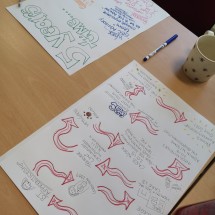Our top tips on breaking bad habits

We previously wrote about forming new habits in our Purposeful Practice blog. That got us and some of our ‘followers’ (thank you Zoe Walls!) thinking and talking about breaking old habits. Honestly, this is something we come across less in our work lives than personal lives – we are usually working with clients who are looking to develop new skills and behaviours, however there definitely are times when it is right to cut something out!
Just as habits are learned through practice, they can be unlearned. Most of us will have unlearned a bad habit at some point in our lives – whether it was quitting smoking, cutting off screen time after 9pm or reigning in our spending. In fact, unlearning a bad habit can be viewed the same as forming a good habit. You can stop being late or start being on time. Here are some top tips for how to get started…
- Identify your triggers. What situations cause you to slip in to your old ways? Find a way to manage these triggers so you deal with them effectively or have a backup plan. If you are trying to stop procrastinating the big jobs and this is worse on days when you have an afternoon meeting, try to arrange morning meetings instead so you can focus on your work afterwards. Or you might keep one day of the week free from meetings so that you can work on important tasks then.
- Break it down. Whatever behaviour you are trying to unlearn, divide it into small components to make it easier to tackle. Perhaps you’re trying to stop agreeing to meetings whilst on-the-go because you will forget to save them in your diary. To unlearn bad habits like this, you need to develop a simple system that works. You could simply decide not to answer the phone so that you can wait until you are in a position with your diary open to call the person back.
- Track your slip ups. Notice when you trip up and identify why it happened. Why were you late to the meeting? Why did you agree to another tight deadline? Always remind yourself of the reason you want to ditch the habit and try to improve gradually by allowing yourself fewer mistakes.
Follow those steps and you’re half way there, but the real key to sustainable behaviour change requires a couple of extra steps;
- Fill the void. If you are trying to stop procrastinating, introduce a new habit to counteract the bad one, so that you can focus your time effectively. You might start writing lists for example.
- Find a mentor. Behaviour change is easier when you have support and someone to report your progress to. Like getting a personal trainer to aid weight loss, a mentor will be able to help you achieve the results you hope for.
As an individual, if you really want to quit a bad habit you should ultimately succeed as that desire will provide the drive and tenacity to work on that change. However, trying to enforce changes on a bigger scale within your team, department or organisation is much more complicated. If your organisation is looking to reform its culture and you are looking for support and guidance, arrange a chat with us to see whether we are able to help.









